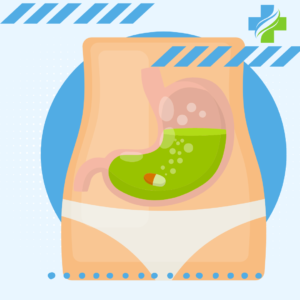Oxalates are found in foods. But did you know, in some individuals, oxalates can harm gut health? Oxalates can actually cause digestive diseases like Crohn’s and diverticulitis.
What are Oxalates
Oxalates are a type of compound that are found in many foods, including vegetables, fruits, grains, and legumes. Some foods that are high in oxalates include:
- Spinach
- Beet greens
- Nuts (such as almonds, cashews, and peanuts)
- Chocolate
- Potatoes
- Soy products (such as tofu and soy milk)
- Black tea
- Rhubard
- Swiss chard
The Role of Oxalates in Metabolism
In small amounts, oxalates are not harmful and are necessary for good health. They play a role in the body’s metabolism and are a natural part of the plant kingdom.
For example, oxalates can bind to calcium in the digestive tract, preventing the absorption of too much calcium. This helps to maintain healthy levels of calcium in the body, which is essential for bone health and many other bodily functions.
In addition, oxalates may have antioxidant properties and may help to protect the body against oxidative stress and inflammation. However, more research is needed to fully understand the potential health benefits of oxalates.
Oxalates, Proteins, and Fats
Oxalates aid in the synthesis and breakdown of amino acids and fatty acids.
Amino acids are the building blocks of proteins, and they play essential roles in many bodily functions, including producing enzymes, hormones, and other molecules. To synthesize an amino acid means producing or building it up from smaller molecules. Amino acid synthesis is a complex process that involves several steps.
Oxalates help synthesize the amino acids aspartate and glutamate. These two amino acids are important neurotransmitters in the brain and play a role in transmitting nerve impulses.
Glutamate also plays a role in the metabolism of sugars and fats and helps regulate the body’s acid-base balance. Glutamate is also involved in the transport of potassium ions across cell membranes.
Fatty acids are a fat (also called lipids) used in energy production and the structure of cell membranes. Oxalates can help to break down fatty acids in the body. Breaking down the fatty acids allows the acid to be used for energy or stored for later use.
Overall, the role of oxalates in metabolism is complex and not fully understood. More research is needed to fully understand the specific ways in which oxalates are involved in metabolism and how they may impact health.
What is Oxalate Intolerance
 However, some people may have a condition called oxalate intolerance, in which they have trouble digesting and metabolizing oxalates. This can lead to a build-up of oxalates in the body, which can cause health problems.
However, some people may have a condition called oxalate intolerance, in which they have trouble digesting and metabolizing oxalates. This can lead to a build-up of oxalates in the body, which can cause health problems.
The build-up of oxalates in the system can cause excessive binding of calcium and other minerals in the digestive tract. When oxalates combine with calcium and minerals they become difficult for the body to absorb. This can lead to decreased absorption of calcium and other minerals, which can negatively impact the nervous system, mental health, and a variety of other areas of the body. It can also lead to irritation and inflammation in the digestive tract.
Some studies have suggested that high levels of oxalates in the diet may be associated with an increased risk of developing kidney stones and other health problems.
How Oxalate Intolerance Affects Digestive Diseases
Some people with irritable bowel syndrome (IBS) may be sensitive to oxalates and experience symptoms such as abdominal pain, bloating, diarrhea, or constipation after consuming foods high in oxalates.
In some cases, people with Crohn’s disease may develop problems with the absorption of fat-soluble vitamins, such as vitamin D, which can lead to a deficiency. Low vitamin D levels can affect the body’s ability to absorb calcium. If the body does not have enough calcium to bind to oxalates, the oxalates can build up in the body and form crystals. These crystals increase inflammation in the body.
Some evidence suggests that high levels of oxalates in the diet may increase the risk of diverticulitis. One theory is that oxalates increase the production of oxalate crystals in the digestive tract. These crystals can irritate and inflame the diverticula in the small intestine, leading to diverticulitis.
Overall, more research is needed to fully understand the relationship between oxalates and digestion. But, if you think oxalates might be a piece of your digestive issues, try reducing foods that contain oxalates. If you find your digestion improves, you may be on to something!
Are you experiencing digestive issues or struggling with gut health?
Science has taught us space has five dimensions – length, width, height, past, and future. The five dimensions of space are the framework in physics and mathematics that define the properties of the universe. A solution that can address all five dimensions can create a comprehensive solution to your wellness.
I’ve created the five-dimensional solution. I’ve trained in food, supplements, and Western science and help you create your physical framework for wellness. Yet, without your past and future, you are missing how you got here and where you are going. My extensive training in Chinese Herbal Medicine delivers a holistic method to address and repair your past. I marry all this information with the lost art of eating to heal and Chinese Nutritional Therapy to show you how to create your future. Ready to learn more? Check it out here!


